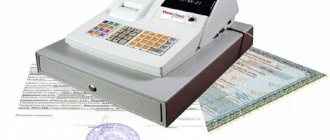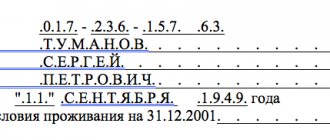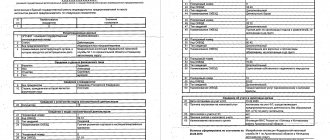About the importance of the address for individual entrepreneurs
The place of registration plays an important role for an entrepreneur, since only current information must be indicated in the current documentation, otherwise the company will be denied registration. The registration process is carried out at the applicant’s place of residence, further activity of the enterprise and control over it is carried out taking into account the residential address. If a situation arises when a person needs to change his place of residence, he must inform the tax office, which will replace the registration data.
Re-registration of individual entrepreneurs
In business practice, situations when you need to register an individual entrepreneur for another person do not happen so often. But at the same time, another procedure is more in demand - re-registration. We are talking about changing the data about the current owner of the individual entrepreneur. However, the face itself does not change.
The process will require contacting the tax office with a certain package of documents. There are several reasons for re-registration:
- change of place of residence or registration;
- changing your full name to something else;
- gender change;
- change of citizenship.
Two more specific reasons can be noted: changes in OKVED activity codes and detection of errors in the Unified State Register of Individual Entrepreneurs data. The first occurs if a businessman, during the registration of an individual entrepreneur, incorrectly chose the type of activity to be carried out or did not indicate additional points. In the second case, an error may occur due to the fault of a civil service employee who entered incorrect data into the database. In this case, the actual opening of a new enterprise occurs. For this reason, when registering, it is recommended to carefully study all documentation to eliminate errors.
How is a change of IP address registered?
The procedure for changing the legal address of an entrepreneur takes a minimum of time and is carried out today according to a simplified procedure. It began operating in 2011. The main condition for individual entrepreneurs, which was in effect before, was not to delay the new registration. For failure to comply with deadlines for providing information, businessmen were threatened with penalties. Today this rule is not mandatory.
According to the simplified scheme, which has been in effect for the last 5 years, an entrepreneur does not have to worry about the tax service losing him. After registering at a new address, the passport office employees themselves report this to the Federal Tax Service. Based on the information received, the inspection makes changes to the Unified Register of Individual Entrepreneurs. The documents are sent for service to another department of the Federal Tax Service, which is located at the new place of residence.
Registration authorities have 10 days to transfer registration information to the Federal Tax Service. Tax service employees, in turn, are given 5 days to send documents.
In practice, a new chain of actions often fails, resulting in problems for the individual entrepreneur. Therefore, to avoid misunderstandings, experienced businessmen prefer to visit the Federal Tax Service themselves.
Ways to expose criminals
The Tax Service has special automated algorithms for analyzing the frequency of transfers, the size of amounts and the interaction of organizations with individual entrepreneurs. Based on the information collected by the program, additional verification is carried out. Tax staff:
- Personnel of LLCs and individual entrepreneurs are interviewed.
- Collect information about payments and transfers.
- They order cash under the guise of an individual entrepreneur or offer the head of the company to cash out.
Inspection schemes keep up with the scammers' schemes, so any gullible company executive who pursues a simple offer to receive cash can receive punishment.
When and how should the tax office be changed?
The concept of “legal address” is considered as a mandatory requisite of an enterprise, since the tax service always monitors the implementation of legislation on linking individual entrepreneurs to a specific location. penalties are applied to it : a fine, blocking of accounts, denial of VAT deductions, etc.
In order not to incur the wrath of the Federal Tax Service, entrepreneurs should not take lightly the determination of the exact and real registration address, as well as informing the tax service about its change. The registration address must be changed to a new one when moving and reported to the Federal Tax Service office where the company was previously registered. Information about individual entrepreneurs is transferred for control to another department of the Federal Tax Service at the place of residence.
If a businessman intends to handle re-registration personally, it is recommended that you familiarize yourself with the procedure for transferring business to a new address.
If an entrepreneur plans his move in advance, then it is worth preparing in advance for a change of address by notifying the Federal Tax Service. This is due to the fact that the transfer of documentation related to forwarding takes a long time.
The individual entrepreneur receives payment from the client to a personal card
The Tax Code does not directly prohibit the use of personal cards for individual entrepreneurs. But there are reservations in the instructions of the Central Bank and in the conditions of banking services (Instruction of the Bank of Russia dated May 30, 2014 No. 153-I). One of the restrictions, we repeat, is the inadmissibility of using a personal account in business activities. If this happens, the bank may suspend or completely stop using the bank card.
An interesting case was heard in the Samara Regional Court. The head of the LLC demanded that the bank’s actions to block his bank card be declared illegal (Appeal ruling of the Samara Regional Court dated June 6, 2016 No. 33-7055/2016).
The situation was as follows: the head of an LLC, an individual, systematically used his personal card for business activities. The company he runs sells used cars, including as a commission agent. The company periodically urgently needed free money to conclude profitable deals. The head of the LLC entered into targeted loan agreements with his company, under the terms of which he borrowed money from the company for commercial purposes. He transferred money to the company's current account from his personal bank card. After the transactions were concluded, the company returned the loan to its manager to his bank card.
The court concluded that the bank's actions were legal. The bank card of an individual was used by him in business activities. The turnover on the card aroused reasonable suspicions of the bank, which was the reason for an inspection and, based on its results, a decision was made to block the card.
Advice. If a client offers to transfer money to an individual entrepreneur’s personal card, or the individual entrepreneur asks the client to do this, then keep in mind:
- the bank may classify such transactions as doubtful;
- the bank card holder should prepare documents to justify the economic meaning of the transactions;
- a bank card may be blocked due to violation of the current account use regime (the account is not intended for transactions related to business activities);
- The bank account agreement can be terminated if such a condition is provided for in the agreement with the bank. If the bank twice during the calendar code decided to refuse to carry out a suspicious transaction because the client did not provide explanatory documents, the contract may also be terminated.
Application for change of address
If an individual entrepreneur prefers to independently inform the Federal Tax Service that his registration address has changed, it is not enough for him to simply inform the responsible person. You need to collect a package of documents and write an application. It is written on a special standard form, form P24001 . You must fill it out in block letters. This is usually done in printed form on a computer, as this format guarantees clarity of design.
The application form requires several additions. In this case, fill out those that are necessary when changing the registration address, specifically sheet “B”. Additions are indicated by a special letter code.
The application must be accompanied by a copy of your passport, TIN, and individual entrepreneur registration certificate. The signature on the application must be notarized.
How to notify the tax office?
Until 2011, an individual entrepreneur was required to notify the tax office that he had changed his place of residence, and therefore the registered address of his enterprise. Today the rules have changed, the actions of individual entrepreneurs in this matter have been simplified, so whether or not to inform the tax authorities personally is the choice of businessmen.
Information about the changes will become the property of the Federal Tax Service in any case. The only question is how quickly and efficiently this will happen. In connection with such concerns, experienced entrepreneurs, in the old fashioned way, inform the service themselves, fill out an application and submit the accompanying documents.
Features of accounting with the tax authority
Registration of a new individual entrepreneur is carried out at the territorial branch of the Federal Tax Service at the place of permanent residence of the entrepreneur. At the same time, regardless of the registration address, an individual entrepreneur can do business throughout the country.
However, in some situations, the registration address of an entrepreneur imposes certain restrictions. This applies to the following cases:
- The individual entrepreneur works on the simplified tax system, unified agricultural tax or OSNO. An entrepreneur is required to submit tax returns to the Federal Tax Service office where he is registered. In this case, it does not matter in which territory the individual entrepreneur conducted commercial or other activities. Similar rules apply to the payment of taxes and various contributions.
- An individual entrepreneur works on PSN or UTII. These special tax regimes provide for double registration: at the place of registration and at the place of business activity. In this case, the individual entrepreneur pays taxes in the region in which he is registered. Contributions are made in the entity where commercial activity is carried out.
When changing your registration, you must take into account the above features of tax regimes.
Required documents
When changing the legal address of an individual entrepreneur, many difficulties arise, so entrepreneurs must have information on how to carry out the procedure correctly and in a timely manner by submitting the required application and documents to the Federal Tax Service:
- Photocopies of all pages of the passport, including the registration page. In this case, all sheets must be sewn and numbered; the number of sheets sewn is recorded on the last page.
- Certificate of registration with the tax authority and assignment of a TIN.
- Certificate of state registration of an entrepreneur.
The fact of submission of documents is confirmed by a receipt that the individual entrepreneur receives from the tax office. It indicates a list of documents submitted and indicates the date when re-registration will occur, and the entrepreneur will be issued an extract from the State Register about this.
IP business address
Individuals engaged in business, unlike organizations, can work in any region of the country, regardless of their registration. At the same time, individual entrepreneurs, as a legal entity, are not required to submit documents for registration of a separate division.
But tax accounting for individuals registered as entrepreneurs has one feature. Individual entrepreneurs under an imputed special taxation regime (UTII) and individual entrepreneurs working under a patent (PSN) are registered at the place where they carry out their actual activities.
So, an individual entrepreneur with a residence permit in Lipetsk plans to open a workshop for the repair and maintenance of household appliances on a single tax in Voronezh. In this case, in order to register as a UTII payer, the entrepreneur must submit an application to the Voronezh Tax Inspectorate, where he will subsequently pay tax, and submit reports.
In such a situation, entrepreneurs do not need to register in the simplified and general system at the place of business. They will pay taxes and report to the Federal Tax Service at their place of registration.
Cost and terms
At the choice of the entrepreneur, he can independently prepare documents, fill out an application, submit the package to the Federal Tax Service, or resort to the services of companies that deal with such issues. You can issue a power of attorney for the executor and receive a ready-made extract in 2 months, without worrying about anything.
The cost of services depends on their volume. The maximum cost of this service is up to 7 thousand rubles. Providing a minimum set of services, for example, filling out documents, will cost the customer around 3 thousand rubles.
If an individual entrepreneur, in order to save money, decides to do everything on his own, then there is no guarantee that he will do it efficiently. He will save money, but will waste a lot of time.
The period for registration at a new address is at least 7 working days. In practice, deregistration in one place and transfer to another can take months. If the address has changed to another region, then additional difficulties will arise.
Mechanism of system functioning
If an individual entrepreneur carried out one of the listed types of activities, then he is obliged to pay mandatory payments in equal installments from the moment of transition to the OSN. The payment deadline is the 20th day of each month following the reporting period. Current legislation defines the reporting period as 1st quarter. To fully pay the tax due, the individual entrepreneur must do the following:
- calculate tax on a general basis from the moment the patent is issued in the event of loss of the right to it;
- calculate the amount of the penalty for each day of forced delay;
- make other obligatory payments on a general basis.
At the same time, the legislation provides for a rule that exempts individual entrepreneurs from the need to pay VAT on a general basis for the period when the PSN was still in force.
To do this, it is necessary to document that during the last 3 months of the patent’s validity, the total income from the cost of goods and services sold did not total 2 million rubles.
Even if this fact is confirmed, further accounting of the tax base is carried out on a general basis. In case of incorrect calculation, incomplete or late payment, administrative sanctions are applied to entrepreneurs.
The legislative framework
The procedure for transferring information about an individual entrepreneur who has changed his place of residence is described in detail in Letter of the Federal Tax Service of the Russian Federation N SA-4-14/1645, which sets out the legal norms for registering legal entities:
- When an entrepreneur changes his place of residence, he will not have to, as before, report this to the Federal Tax Service himself. From 07/01/2011, information about a change in the place of residence of an individual entrepreneur is transmitted to the tax office by the registration authority, in which the citizen registers at a new address.
- The tax service, having received this information, enters it into the Unified State Register of Individual Entrepreneurs.
- The registration file of the individual entrepreneur is sent to the tax office at the new place of registration.
Actions are carried out independently of the entrepreneur himself. This saves him time and ensures that there are no errors when preparing documents.
How to cash out money through an individual entrepreneur
Illegal cash withdrawal through individual entrepreneurs is carried out through shell companies registered in the names of non-existent individuals or marginalized people (homeless people, for example). Then the funds are transferred and withdrawn, and the company is closed.
Cashing out
The second method, more reliable, is cashing through offshore zones. Here the individual entrepreneur himself can find a country where the laws are more lenient. But in recent years, laws have been tightened and tax services, together with legislative bodies, are clearly monitoring schemes for withdrawing illegally earned funds.
Reference ! Legislative acts often use the term “money laundering”, which indicates activities related to the circulation of illegal funds.
If several people are involved in money laundering through individual entrepreneurs, then representatives of the law may regard this as an operational criminal group (OCG).
Why is an individual entrepreneur used to withdraw money? The banks in which entrepreneurs maintain their accounts do not have as much control over them as they do over legal entities. At least that's how it used to be. Now, if a bank employee considers an entrepreneur’s transactions suspicious, he has the right to block the account without warning.
One of the simplest schemes:
- Owners of any business find individual entrepreneurs, often based on an advertisement providing intellectual services;
- Intellectual services are intangible, which means that the fact of their provision is quite difficult to verify;
- Under the guise of payment, a legal entity transfers money to the individual entrepreneur’s account, and subsequently to the individual’s card (or directly directly to the card, but this is more complicated);
- The individual entrepreneur pays the established tax (depending on the applicable tax system);
- The individual entrepreneur gives the money to the business with the exception of the commission percentage.
Why might the tax office or bank suspect illegal circulation of funds? The biggest problem is that in order to withdraw money without arousing suspicion, you need to withdraw money rarely and in small amounts.
Cashing scheme
For such illegal transactions, in most cases, individual entrepreneurs are turned to to withdraw funds that contradict the market value of their services. For example, it is necessary to withdraw 500,000 rubles and a legal entity cashes the money from an individual entrepreneur under the guise of a fee for translation services or tutoring in the Chinese language from 1 or 2 persons. Of course, such a large amount will raise suspicions.
The second reason is frequent withdrawals of funds, more than 2 times a month. It is also suspicious if the individual entrepreneur cooperates with only one single company, or the individual entrepreneur and one of the founders/managers are relatives. A common mistake made by entrepreneurs is the reflection of receiving money for a service that is not included in OKVED codes.
Possible difficulties
Changing a legal address is a difficult procedure in legal terms, since an entrepreneur will have to deal with some subtleties of legislation and legal practice when resolving this issue. Difficulties in the re-registration process:
- Change of tax office . The difficulty lies in the fact that the individual entrepreneur needs to reconcile the execution of all financial transactions.
- Double payments can occur as a result of the fact that documents left one branch, did not arrive at another, and were not officially transferred to a new address. Therefore, the next payment can be charged in 2 places.
- Changes in documentation . When changing the address, changes are made to the company's Charter and constituent documents.
- Delays in the transfer of registration data from one branch of the Federal Tax Service to another. This happens for objective reasons: the business of an individual entrepreneur has a multifaceted structure associated with the implementation of numerous financial transactions, so it is important not to miss the details during the transfer.
If an entrepreneur has registered an enterprise not at his residence address, but has purchased premises, then unpleasant misunderstandings may arise about the unreliability of the new address. Before purchasing, it is necessary to check whether the new address is on the “black” list of the Federal Tax Service, otherwise the re-registration of the company will be refused. There is a possibility that the tax inspectorate will take administrative penalties against the individual entrepreneur.
Illegal circulation of funds
The consequences of cashing out money through individual entrepreneurs and LLCs are associated with the spread of corruption schemes, impoverishment of the budget (due to concealment of taxes) and a reduction in funds for pension payments due to the payment of salaries “in an envelope”.
Enterprises that cooperate with state and municipal authorities and cash out money as part of illegal schemes are essentially stealing money from local and federal budgets.
Private companies cite the need to pay workers on time, who often work informally, as well as the heavy tax burden and demands for bribes from bureaucrats.
Cashing schemes
How is money laundered through individual entrepreneurs and enterprises? The schemes are different, but they all start with the withdrawal of money from the company’s account. The director of the company draws up the necessary documents that explain this banking operation. Usually the money supposedly goes to pay for services rendered. The services are provided by a one-day company, the creator of which receives a percentage of the scheme.
Services, in fact, are usually not provided and all documents confirming payment for them are fake. In this case, the director of the company illegally cashes out the money, since he avoids paying part of the taxes, artificially inflating the company's expenses.
There are schemes that do not require an intermediary, but use fake documents. Each method of fraudulently obtaining cash is modified in specific circumstances. But for the most part, the schemes are well known to Tax Service employees.
The most common of them:
- Using dummies.
- With the help of bank employees.
- Through shell companies.
- Using false documents.
- Through maternity capital certificates.
Let's take a closer look at the main cash-out schemes.
Cashing through individual entrepreneurs
Individual entrepreneurs often act as participants in enterprise cash-out schemes. On the one hand, such schemes are more difficult to detect. On the other hand, if Tax Service employees can prove the illegality of the transaction, then, unlike a disappeared shell company, it will be easier to hold a private person accountable. The entrepreneur will be in the dock together with the head of the enterprise.
The essence of the scheme for cashing out funds through an individual entrepreneur is concluding an agreement with him for the provision of services. At the same time, they choose services the provision of which is very difficult to control:
- Commissioning works.
- Freight transportation.
- Trainings, education, consultations.
If some time passes after the work has been completed, it will be impossible to prove the fact that it was completed at all. Proof requires testimony from eyewitnesses who will say that no work was carried out.
The convenience of the scheme for withdrawing money through an individual entrepreneur is that he can withdraw any amount of money from his account, and he provides reporting on expenses in general.
Have a question for a lawyer? Ask now, call and get a free consultation from leading lawyers in your city. We will answer your questions quickly and try to help with your specific case.
Telephone in Moscow and the Moscow region: +7
Phone in St. Petersburg and Leningrad region: +7
Free hotline throughout Russia: 8 (800) 600-25-34
Cashing through LLC
Within the company, you can receive money without involving intermediaries. Schemes of this kind are more complicated, but the head of the company does not need to share it with an intermediary.
Within an LLC, the following is used to cash out money:
- Inflating expenses and transferring money to individual entrepreneurs.
- Taking out a loan for a long term.
- Calculation of dividends.
- Via debit cards.
- With the help of persons to whom money is transferred for reporting purposes.
Specific transactions can take different forms.
Overstatement of gross costs
A common way to get cash is to buy a batch of fuel coupons by bank transfer, and then sell them for cash. Thus, the head of a company can receive up to several million rubles.
But this scheme is well known to the Tax Service, and its use is subject to fines under the Criminal Code of the Russian Federation.
Long-term loan
Receiving such a loan from a bank allows you to immediately become the owner of an impressive amount of cash without withdrawing it from the LLC’s account. However, from a legal point of view, it is difficult to make claims against such a scheme. Taking out loans to buy a car or other needs is not prohibited. If the company has a founder, using its funds to obtain a loan is also allowed. Such loan money is not subject to tax. The borrower deposits them into a personal account at interest. This aspect is controversial, since, on the one hand, it is permitted by law, and on the other, it allows you to evade taxes.
The risks of using such a scheme are associated with a long loan term. The amount of money must be returned, but during this time the LLC may go bankrupt or inflation may lead to a significant decrease in the value of money.
Calculation of dividends
The LLC status allows the payment of dividends from profits to its founders. As a result, the amount of taxes is reduced, since they are paid not on all profits, but on part of them minus dividends.










